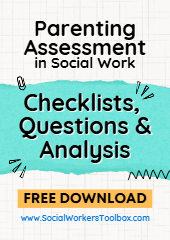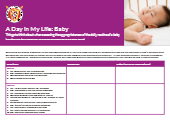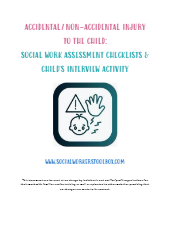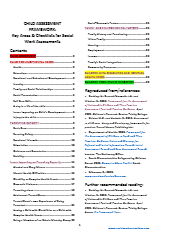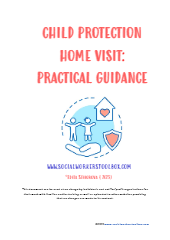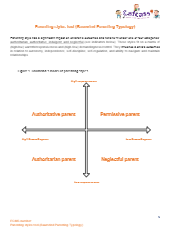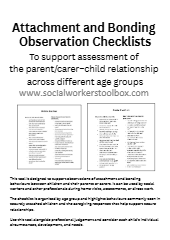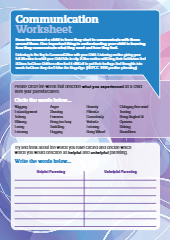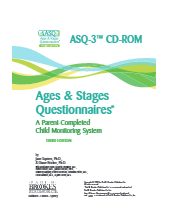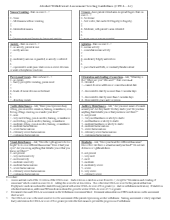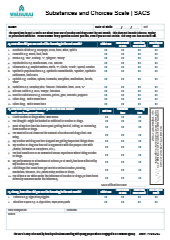Category: Assessment: Parents
Parenting Assessment in Social Work: Free Checklists & Questionnaires
Alcohol & Drug Use This resource helps professionals explore how a parent’s use of alcohol or drugs may be affecting their child. It includes structured questions covering the parent’s history,…
Daily Routine Assessment Tool – “A Day in My Life: Baby”
A Day in My Life: Baby” is a free, downloadable PDF tool developed to help professionals understand and assess a baby’s daily routine and lived experience. Developed by Worcestershire Safeguarding,…
Neglect Toolkit: Guidance and Assessesment Tool
The Neglect Toolkit: Guidance and Assessment Tool is a comprehensive resource developed to assist professionals in assessing and addressing cases of neglect concerning children’s well-being. The toolkit provides a structured…
Accidental/non-accidental injury to the child: Social work assessment checklists & child’s interview activity
(You can download the guidance below in a PDF document here.) SOCIAL WORKER’S QUESTIONS FOR EACH ADULT WHO WAS PRESENT DURING THE INJURY In situations involving a concerning child injury, it…
Graded Care Profile 2 – Quality of Care/Neglect Assessment Tool & Guidance
The Graded Care Profile 2 (GCP2) is an updated version of the original Graded Care Profile tool, designed to assess the quality of care provided to an individual child over…
The Child Assessment Framework: Key Areas & Checklists for Social Work Assessments
The Child Assessment Framework: Key Areas & Checklists for Social Work Assessments is an invaluable resource that assists social workers in systematically gathering essential information to promote the well-being and…
Neglect Toolkit for Practitioners: Assessment tools, checklist, questionnaires, worksheets
The Neglect Toolkit for Practitioners is an exceptional resource developed by East Sussex County Council. This toolkit provides a wide range of assessment tools, checklists, questionnaires, and worksheets to support…
Child Protection Home Visit: Practical Guidance
(You can download the guidance below in a PDF document here.) WHEN THERE IS NO ANSWER WHEN YOU KNOCK: If the family does not answer the door when you knock, listen…
Parenting styles tool
The Parenting Styles Tool is a valuable resource developed by Cafcass to help parents and carers assess their own parenting style and understand its impact on their child. This tool…
Home Visit Observations of Parent-Child Interactions Questionnaire/Checklist
The Home Visit Observations of Parent-Child Interactions Questionnaire/Checklist is a valuable toolkit designed to support social workers and practitioners in observing and influencing parent-child interactions during home visits. The toolkit,…
Attachment and Bonding Observation Checklists: To support assessment of parent/carer child relationship
The Attachment and Bonding Observation Checklists is a free, printable PDF tool created to support professionals in assessing the quality of attachment and relational bonding between children and their parents…
Pre-Birth Assessment Tool
The Pre-Birth Assessment Tool is a resource designed to support professionals in thoroughly examining various factors related to a mother’s pregnancy and the overall circumstances of the family. The tool…
Parenting worksheets (assessment tool)
The tool covers various aspects of parenting including communication, emotional development, boundaries, behavior, play/stimulation, stability, and the effects of drugs/alcohol. They encourage reflection on one’s own childhood and parenting approaches….
SCODA: Risk assessment of parental drug use and its impact on children Tool
The CAFCASS SCODA Risk Assessment Checklist is a tool used by social workers to assess the potential risks and protective factors in cases involving parents or caregivers with drug issues….
Edinburgh Postnatal Depression Scale (EPDS) in 37 Languages
The Edinburgh Postnatal Depression Scale (EPDS) is a free and widely recognised self-report questionnaire designed to screen for postnatal and antenatal depression. It consists of 10 statements that assess depressive…
Ages & Stages Questionnaires ASQ-3 (Child development screening tool)
The Ages & Stages Questionnaires ASQ-3 is a comprehensive set of questionnaires designed to assess children’s development from 2 to 66 months. These questionnaires can be easily administered by parents…
Impact of Parental Conflict Tool
This tools helps professionals identify and analyse the emotionally harmful impact of parental conflict on a child. The resource consists of a list of 10 indicators that can be used…
Rosenberg Self-Esteem Scale
As a social worker, you may find the Rosenberg Self-Esteem Scale to be a valuable and effective assessment tool in your work with clients. This 10-item scale is widely used…
The Family Activity Scale
The Family Activity Scale is a valuable assessment tool designed to examine the environment and level of engagement provided for children within their family. It offers practitioners an opportunity to…
The Recent Life Events Questionnaire
The Recent Life Events Questionnaire is a valuable tool designed to gather information about recent life events experienced by individuals or families. It focuses on events that have occurred within…
Adult Wellbeing Scale
The Adult Wellbeing Scale is a compact assessment tool that focuses on an adult’s emotional state, specifically examining feelings of depression, anxiety, and irritability. The scale comprises questions presented in…
The Parenting Daily Hassle Scale
The Parenting Daily Hassle Scale is a recommended assessment tool for social workers who work with children and families. It is endorsed by the Department of Health and is part…
The Strengths and Difficulties Questionnaire
The Strengths and Difficulties Questionnaire is a recommended assessment tool by the Department of Health in the Framework for the Assessment of Children in Need and their Families. It serves…
Home Conditions – Assessment Tool
The Home Conditions Assessment Tool is a concise assessment designed to evaluate the living conditions of a home and assess their impact on the children residing there. It encompasses 20…
Clinical Institute Withdrawal Assessment for Alcohol (CIWA)
The Clinical Institute Withdrawal Assessment for Alcohol (CIWA) is a widely used tool in assessing the severity of alcohol withdrawal syndrome. It consists of a ten-item scale questionnaire designed to…
The Substances And Choices Scale – SACS
The SACS (Substances and Choices Scale) is a free, clinically validated screening and assessment tool created for health professionals supporting young people who are engaged in substance use treatment. Developed…
DAST: Drug Abuse Screening Test
DAST: Drug Abuse Screening TestThe Drug Abuse Screening Test (DAST-10) is a concise screening tool used to assess drug use within the past 12 months. It consists of 10 items…
Barnardo’s Domestic Violence Risk Identification Matrix – Assessing the risks to children from male to female domestic violence
The Domestic Violence Risk Identification Matrix (DVRIM) is a detailed and practical resource created by Barnardo’s to assess risks to children and families impacted by domestic violence. This tool helps…
Severity of Alcohol Dependence Questionnaire (SADQ)
The Severity of Alcohol Dependence Questionnaire (SADQ) is a self-administered, 20-item questionnaire specifically designed by the World Health Organization (WHO) to assess the severity of alcohol dependence in individuals who…
Alcohol Use Questionnaire
The Alcohol Use Questionnaire from the Framework for the Assessment of Children in Need and their Families is a screening tool recommended by the Department of Health. It is known…
